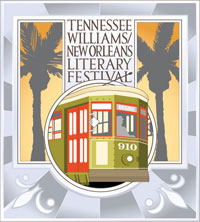The annual Tennessee Williams literary festival continues this weekend with dozens of events culminating in Sunday’s famous “Stella!” Shouting contest. Headquartered at the Hotel Montelone, the festival offers panel dicussions popular and scholarly, masters classes for aspiring writers and a host of other events including Literary Late Nights, walking literary tours and more.
 Once again Odd Words will be there live-blogging selected events across all four days. In addition to the Odd Word’s pick for Best of the Fest, we will post daily event highlights and write-ups of selected panels, appearing here, on the Odd Words blog, and on NolaVie. Also, follow @oddwords on Twitter for real-time updates while taking notes and balancing a cup of coffee on my knee. There is no extra admission charge to watch me do this. Just find the old fart in the young man’s hate.
Once again Odd Words will be there live-blogging selected events across all four days. In addition to the Odd Word’s pick for Best of the Fest, we will post daily event highlights and write-ups of selected panels, appearing here, on the Odd Words blog, and on NolaVie. Also, follow @oddwords on Twitter for real-time updates while taking notes and balancing a cup of coffee on my knee. There is no extra admission charge to watch me do this. Just find the old fart in the young man’s hate.
Current copyright “is something of a steampunk law…full of Rube Goldberg contraptions,” New Orleans intellectual property attorney Marie Breaux told the Tennessee Williams Festival Master Class on copyright. “The copyright is not of our time…was drafted to address analog issues.” It does not fit any longer because publication is defind in very physical terms. “What happen to a journal that is only published online? We have some guidance from the Registrar [of Copyrights] but we just don’t know.”
“It may be OK for a library to scn a work and email it to a patron but not to post it on the website,” she gave as one example. And shoe-horning software into the literary copyright box is equally problematic, expecially the idea of work-for-hire when we “live in a freelance world.” Most distrubing of all, she suggests that copyright is killing books. “You’re more able to find a book from 1880 than 1980.” As books fall out of print getting rights clearances discourges other publishers from reissuing a title.
“It’s time for a new law. This is not Marie Breaux, coyright attorney from New Orleans ,” but she says the Registar has said it is time for a new law. Breaux gave an excellent summary of the history of copyright, from the earliest recorded pronouncement of an Irish king who asserted that St. Columba had no right to copy a psalter written and illuminated by St. Finian. He ruled, “to every cow, it’s calf. To every book its copy.” England produced the first copyright law, protecting the exclusive rights of printers who reproduced ancient works. In the United States the basis of copyright was written into the Constitution, the authors anxious to encourage innovation in writing and inventions by providing the protections of copyright and patent.
Nation-based copyright law ran into problems with internationalization in the 19th century. Herman Melville first published Moby Dick in Britian to secure copyright there before the American edition was issued, Breaux explained. However the British publisher accidentally omitted the Epilogue, and British reviewers uniformally panned the book as nonsensible. American newsapers picked up with British reviews (as there were no international copyright agreements), and the book flopped into obscurty based on the British reviews. Charles Dickens also had problems with the United States. He had an official U.S. publisher but no protection from others who reprinted his works without permission or compensation.
Today’s problems with antiquainted law is “we are all infringers,” whether we are forwarding an email (violating the implied copyright of the original author), or coying content from the web and sending it to a friend or reposting it, and even by singing “Happy Birthday” without permission of the publisher. The last illustrates one problem with current copyright law. Over the last century the length of copyright has been continally extended. Breaux used the example of the first Mickey Mouse cartoon “Steamboat Willy.” Everytime that work approaches falling into the public domain, there are amendments to extend the life of copyrights.
The landsape is already changing in response to the Internet and other technologies. She cited the Creative Commons License, which does not alter the copyright but establishes various grants of rights for works put into easiy reproducable forms such as on the Internet. She also cited a growing movement among scholars for Open Source Publication. Many scholarly articles produced by goverment-education scientists doing goverment-subisidized work wind up in scholarly journals that are only available on the Internet behind paywalls. Getty Images, the long-time enforcer of copyright protection for professional photographers, has created an application that allows embedding non-water marked images inside an embedable application that allows Getty to retain control.
“Can we put the toothpaste back in the tube?” one of her cloing PowerPoint (c) slides asked. “Nope” was her answer. “The [current] copyright [law] is not for our time.”
 NOLAbeings
Multimedia artist Claire Bangser created NOLAbeings as a portrait-based story project that marries...
NOLAbeings
Multimedia artist Claire Bangser created NOLAbeings as a portrait-based story project that marries...
 Data corner: Adobe Suite (create a PDF, social media graphic, presentation, edit a photo and video
Data corner is where you go to work with analytics and top tech skills. It takes on everything from PERL and SQL to Canva and Sprout Social.
Data corner: Adobe Suite (create a PDF, social media graphic, presentation, edit a photo and video
Data corner is where you go to work with analytics and top tech skills. It takes on everything from PERL and SQL to Canva and Sprout Social.
